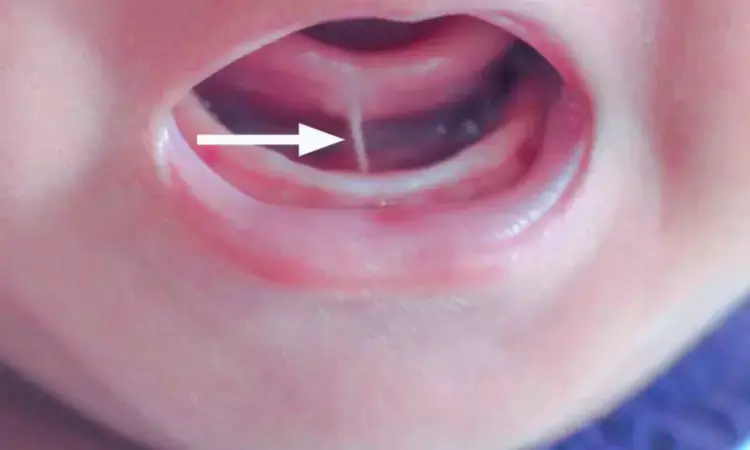- Home
- Medical news & Guidelines
- Anesthesiology
- Cardiology and CTVS
- Critical Care
- Dentistry
- Dermatology
- Diabetes and Endocrinology
- ENT
- Gastroenterology
- Medicine
- Nephrology
- Neurology
- Obstretics-Gynaecology
- Oncology
- Ophthalmology
- Orthopaedics
- Pediatrics-Neonatology
- Psychiatry
- Pulmonology
- Radiology
- Surgery
- Urology
- Laboratory Medicine
- Diet
- Nursing
- Paramedical
- Physiotherapy
- Health news
- Fact Check
- Bone Health Fact Check
- Brain Health Fact Check
- Cancer Related Fact Check
- Child Care Fact Check
- Dental and oral health fact check
- Diabetes and metabolic health fact check
- Diet and Nutrition Fact Check
- Eye and ENT Care Fact Check
- Fitness fact check
- Gut health fact check
- Heart health fact check
- Kidney health fact check
- Medical education fact check
- Men's health fact check
- Respiratory fact check
- Skin and hair care fact check
- Vaccine and Immunization fact check
- Women's health fact check
- AYUSH
- State News
- Andaman and Nicobar Islands
- Andhra Pradesh
- Arunachal Pradesh
- Assam
- Bihar
- Chandigarh
- Chattisgarh
- Dadra and Nagar Haveli
- Daman and Diu
- Delhi
- Goa
- Gujarat
- Haryana
- Himachal Pradesh
- Jammu & Kashmir
- Jharkhand
- Karnataka
- Kerala
- Ladakh
- Lakshadweep
- Madhya Pradesh
- Maharashtra
- Manipur
- Meghalaya
- Mizoram
- Nagaland
- Odisha
- Puducherry
- Punjab
- Rajasthan
- Sikkim
- Tamil Nadu
- Telangana
- Tripura
- Uttar Pradesh
- Uttrakhand
- West Bengal
- Medical Education
- Industry
New AAP Report Provides Recommendations on Ankyloglossia Diagnosis and Breastfeeding Challenges

USA: The American Academy of Pediatrics (AAP) has released a clinical report and recommendations on identifying and managing ankyloglossia and its effect on breastfeeding in infants.
According to the recommendation published in Pediatrics, pediatricians and other specialists have an important role in identifying ankyloglossia, a condition present at birth and commonly referred to as tongue-tie, and its effect on breastfeeding in infants.
While the AAP recommends exclusive breastfeeding for about six months with possible continuation for two years or longer, ankyloglossia can impede breastfeeding, Jennifer Thomas, Department of Pediatrics, Advocate Aurora Health, Milwaukee, Wisconsin, and colleagues noted.
Ankyloglossia, commonly known as tongue-tie, "limits the tongue's movement due to a short or tight band of tissue called the lingual frenulum, which connects the underside of the tongue to the floor of the mouth," the authors explained. This restriction "can hinder breastfeeding by preventing the infant from extending and lifting their tongue effectively to latch onto the nipple and suckle properly."
They wrote, "Currently, there are no standardized diagnostic criteria for the condition, and treatment approaches remain unsettled. Despite this, both diagnoses and the frequency of performing frenotomy—a procedure that involves cutting the lingual frenulum—have recently seen an increase."
A series of studies conducted in the U.S., Canada, and England have revealed that the rate of tongue-tie diagnoses in newborns varies between 1.7% and 10.7%. In the U.S., diagnoses surged nearly tenfold from 1997 to 2012, with a further doubling from 2012 to 2016. This trend was mirrored by an increase in frenotomy procedures.
Although several tools for assessing ankyloglossia severity have been published, none have been validated, according to Thomas and his colleagues. Recent reviews of small randomized trials on frenotomy also failed to demonstrate whether the procedure leads to long-term breastfeeding success or alleviates maternal pain.
The report's recommendations include that infants with ankyloglossia who are feeding normally should not undergo intervention. Additionally, frenotomy is not supported for preventing future issues like speech problems or obstructive sleep apnea. Experts also do not agree on posterior tongue-tie as a valid reason for surgery, and labial and buccal frenae, as well as sucking blisters, are considered normal and do not require surgical intervention.
For cases of inadequate breastfeeding, a multidisciplinary approach involving lactation specialists, feeding therapists, surgeons, and pediatricians is crucial for optimal outcomes. Newborns with symptomatic ankyloglossia should receive breastfeeding support in the hospital, follow-up care post-discharge, and monitoring of weight gain. Surgical options, including frenotomy versus laser treatment, should be considered only after evaluating and addressing other breastfeeding issues. While the evidence is limited, frenotomy might reduce maternal nipple pain, contributing to successful breastfeeding.
Thomas and his team stress that frenotomy should be performed by a trained professional who provides a comprehensive discussion of alternatives, risks, benefits, pain control options, and post-surgical care. They also emphasize the importance of preventing surgical complications, managing hemorrhage risk, and avoiding evidence-free practices such as stretching exercises.
The team concluded that further research is needed to establish standardized methods for diagnosing and classifying ankyloglossia, assess long-term outcomes, and understand the natural history of the condition and its risks to feeding.
Reference:
Jennifer Thomas, Maya Bunik, Alison Holmes, Martha Ann Keels, Brenda Poindexter, Anna Meyer, Alison Gilliland, SECTION ON BREASTFEEDING, SECTION ON ORAL HEALTH, COUNCIL ON QUALITY IMPROVEMENT AND PATIENT SAFETY, COMMITTEE ON FETUS & NEWBORN, SECTION ON OTOLARYNGOLOGY-HEAD AND NECK SURGERY; Identification and Management of Ankyloglossia and Its Effect on Breastfeeding in Infants: Clinical Report. Pediatrics 2024; e2024067605. 10.1542/peds.2024-067605
Dr Kamal Kant Kohli-MBBS, DTCD- a chest specialist with more than 30 years of practice and a flair for writing clinical articles, Dr Kamal Kant Kohli joined Medical Dialogues as a Chief Editor of Medical News. Besides writing articles, as an editor, he proofreads and verifies all the medical content published on Medical Dialogues including those coming from journals, studies,medical conferences,guidelines etc. Email: drkohli@medicaldialogues.in. Contact no. 011-43720751


